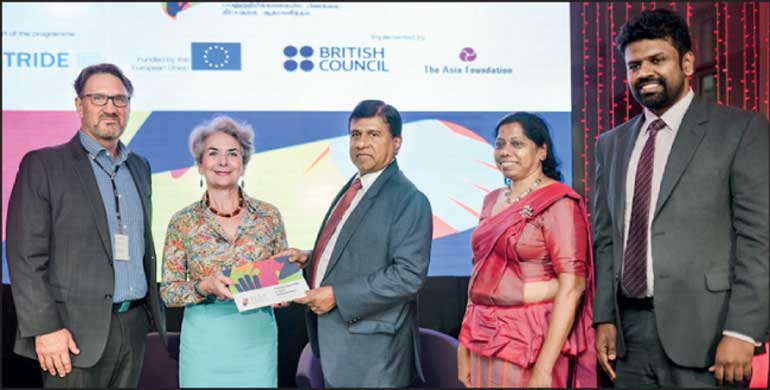Tuesday Feb 24, 2026
Tuesday Feb 24, 2026
Monday, 3 April 2023 00:00 - - {{hitsCtrl.values.hits}}

SEDR Team Leader Jacques Carstens, European Union to Sri Lanka and the Maldives (Interim) Head of Development Cooperation Beatrice Bussi, Minister of Justice, Prison Affairs and Constitutional Reforms Dr. Wijeyadasa Rajapakshe, Ministry of Justice Additional Secretary Krishanthi Meegahapola, and Mediation Boards Commission Secretary Priyanath Perera
The Supporting Effective Dispute Resolution (SEDR) project, funded by the European Union and implemented by the British Council in partnership with The Asia Foundation, launched a Policy Brief titled ‘Strengthening A Just Alternative’ to strengthen community-based alternative dispute resolution (ADR) mechanisms in the country.
The launch event, held at the British Council Library in Colombo, was attended by several distinguished dignitaries, including Minister of Justice Dr. Wijeyadasa Rajapakshe, European Union to Sri Lanka and the Maldives (Interim) Head of Development Cooperation Beatrice Bussi, Mediation Boards Commission Secretary Priyanath Perera, Mediation Boards Commission Chairperson Justice Yapa, and Commissioners of the Mediation Boards Commission.
Speaking at the event, Beatrice Bussi stated, “The importance of mediation in Sri Lanka is twofold, as it ensures an easy and economic access to justice to citizens, while it provides the opportunity to reduce the burden on the Sri Lankan court system. I want to praise the model of Sri Lankan community mediation boards, for its effectiveness and for the value it delivers to communities in addressing local disputes preventing their escalation.”
Dr. Wijeyadasa Rajapakshe stated, “One of the main tasks of the Ministry is to ensure the necessary legal, policy, and institutional framework is set up for efficient resolution of disputes. Alternative dispute resolution, including mediation, play a major role in this regard. There are different opinions regarding the effectiveness of alternative dispute resolution mechanisms, especially mediation among the community and stakeholders. In the meantime, the Ministry has initiated a number of reforms to improve dispute resolution processes in Sri Lanka. Accordingly, the Ministry highlights the importance of surveys of this nature to facilitate evidence-based decision-making regarding alternative dispute resolution mechanisms. As such the Ministry would like to congratulate the SEDR project on this successful initiative.”
The Policy Brief is based on the findings of a Knowledge, Attitudes, and Practices (KAP) survey commissioned by SEDR and conducted by the Centre for Poverty Analysis (CEPA) in 2022. The survey aimed to assess knowledge, attitudes and practices of various community-based alternative dispute resolution mechanisms, including mediation boards. The survey covered six districts in the country, targeting 1,712 households of all three main ethnic groups.
The launch event hosted an expert panel discussion where the panellists spoke about the findings from the KAP survey and how the evidence can used by policymakers and practitioners to strengthen ADR initiatives in the country. The discussion focused on how to increase public awareness of mediation services, the importance of community engagement and participation, the role of women in mediation, as well as the need for more effective ADR communication strategies.
The Policy Brief highlights the importance of investing in mediation training and capacity-building for mediators, improving public awareness of mediation and ADR, and strengthening the legal and regulatory framework for mediation in Sri Lanka. Some of the key survey findings include:
The Policy Brief can be accessed in English/Sinhala and Tamil on SEDR’s website: https://www.sedrsrilanka.org/resources.